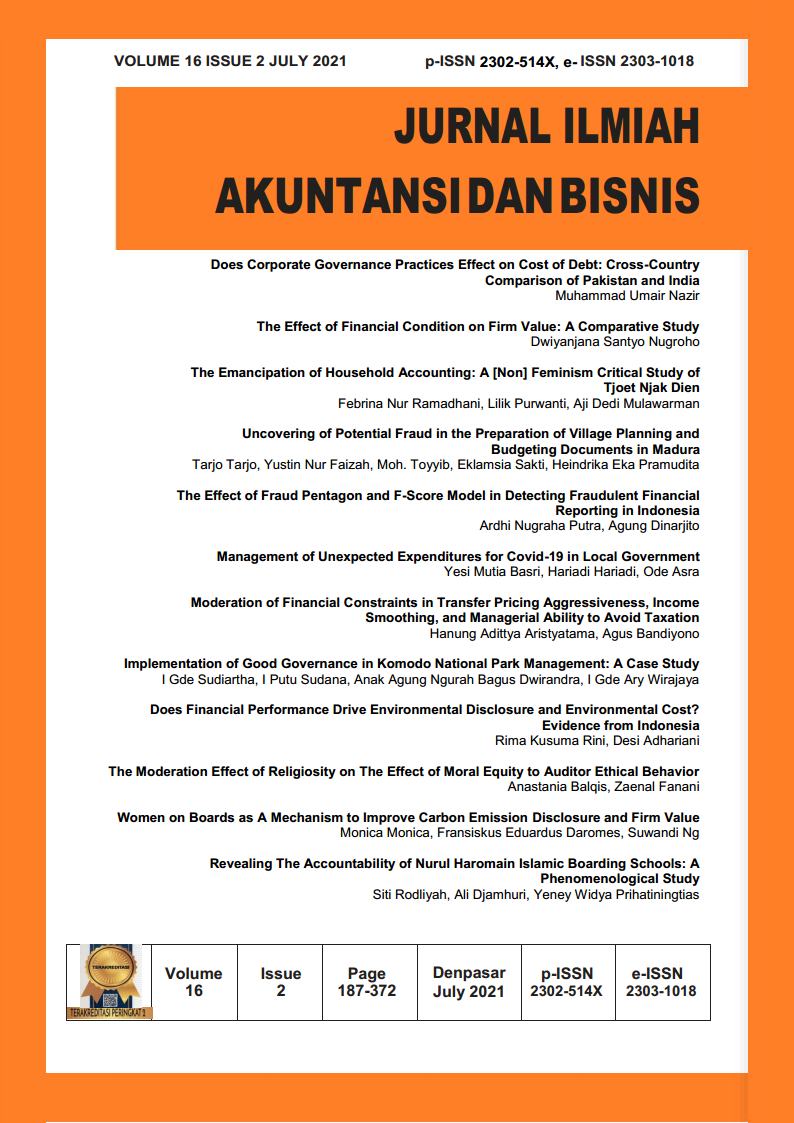Revealing The Accountability of Nurul Haromain Islamic Boarding Schools: A Phenomenological Study
Abstract
The objective of this study is to reveal the sense of accountability at Nurul Haromain Islamic boarding school. Qualitative method and interpretive paradigm were used to understand and explain the accountability practice phenome, and phenomenological approach was used to reveal the sense of accountability based on the experience of individuals, in this case the administrators of the school. This study finds that the sense of accountability is very contextual depending on the space and time as well as individuals who sense it. For the school administrators, accountability is practiced upon the amanah (mandate) that the school should serve as a dakwah institution and the manager of community’s fund in the form of community services and proper financial management. The implication of such accountability is ensured by their faith quality and the enforcement of ethics and morality by human resource seasoned in Islamic boarding school environment.
Keywords: accountability, mandate, phenomenology, Islamic boarding school
Downloads
References
Anwar, A. (2016). Karakteristik Pendidikan dan Unsur-Unsur Kelembagaan di Pesantren. POTENSIA: Jurnal Kependidikan Islam, 2(2), 165–182.
Appelrouth, S., & Edles, L. D. (2007). Sociological Theory in The Contempora Era: Text and Readings. Thousand Oaks, California: Pine Forge Press.
Atufah, I. D., Yuliarti, N. C., & Puspitasari, D. (2018). Penerapan PSAK No . 45 tentang Pelaporan Keuangan Organisasi Nirlaba Yayasan Pendidikan Pondok Pesantren Al-Khairiyah. International Journal of Social Science and Business, 2(3), 115–123.
Belkaoui, A. R. (1992). Accounting Theory (Third ed.). London: Academic Press.
Bovens, M. (2010). Two Concepts of Accountability : Accountability as a Virtue and as a Mechanism. West European Politics, 33(5), 946–967. https://doi.org/10.1080/01402382.2010.486119
Burrell, G., & Morgan, G. (1979). Sociological Paradigms and Organisational Analysis: Elements of The Sociology of Corporate Life. Aldershot, England: Ashgate Publishing Limited.
Chua, W. F. (1988). Interpretive Sociology and Management Accounting Research - A Critical Review. Accounting, Auditing and Accountability, 1(2), 59–79.
Creswell, J. W. (2010). Research Design Pendekatan Kualitatif, Kuantitatif, dan Mixed. Yogyakarta: Pustaka Belajar.
Djamhuri, A. (2011). Ilmu Pengetahuan Sosial dan Berbagai Paradigma dalam Kajian Akuntansi. Jurnal Akuntansi Multiparadigma, 15(4), 1–26.
Fauzi, M. L. (2018). The Roles of Kyai and Pesantren in Preserving Islamic Tradition and Negotiating Modernity. Journal of Indonesian Islam, 6(1), 126–144.
Fikri, A., Sudarma, M., Sukoharsono, E. G., & Purnomosidhi, B. (2004). Studi Fenomenologi Akuntabilitas Non Govermental Organization. Jurnal Akuntansi Multiparadigma, 1(3), 417–428.
Fitria, Y., & Syakura, M. A. (2017). Tabir akuntabilitas “Keroan” pada Akuntan. Jurnal Akuntansi Multiparadigma, 8(1), 90–106.
Goddard, A. (2013). Budgetary Practices and Accountability Habitus. Accounting, Auditing & Accountability Journal, 17(4), 543–577.
Gray, R., Bebbington, J., & Collison, D. (2006). NGOs, civil society and accountability: making the people accountable to capital. Accounting, Auditing & Accountability Journal, 19(3), 319–348.
Handoko, D. C. ., & Huda, S. (2018). Menilik Akuntabilitas Akuntansi dari Budaya Islam. Tirtayasa Ekonomika, 13(2), 330–338.
Hasbiansyah, O. (2008). Pendekatan Fenomenologi : Pengantar Praktik Penelitian dalam Ilmu Sosial dan Komunikasi. mediaTor, 9(1), 163–180.
Jensen, M., & Meckling, W. (1976). Theory of the Firm: Managerial Behavior, Agency Costs and Capital Structure. Journal of Financial Economics, 305–306.
Kalbarini, R. Y., & Suprayogi, N. (2014). Implementasi Akuntabilitas dalam Konsep Metafora Amanah diLembaga Bisnis Syariah (Studi Kasus : Swalayan Pamella Yogyakarta). JESTT, 1(7), 506–517.
Kearns, K. P. (2014). The Strategic Management of Accountability in Nonprofit Organizations : An Analytical Framework. American Society for Public Administration, 54(2), 185–192.
Keating, E. K., & Frumkin, P. (2014). Nonprofit Reengineering Toward Accountability : a Financial More Reliable Foundation for Regulation. American Society for Public Administration, 63(1), 3–15.
Kovach, H., Neligan, C., & Burral, S. (2003). Power Without Accountability? The Global Accountability Report 1. London: One World Trust.
Laughlin, R. C. (1990). A Model Of Financial Accountability and The Crunch Of England. Financial Accountability & Management, 6(2), 93–114.
Mahlel, Ridwan, M., & Nasirwan. (2016). Akuntabilitas dan Transparansi Berbasis Bagi Hasil (Analisis terhadap Karyawan Toko di Kota Beureunuen). J-EBIS, 2(2), 1–20.
Merriam, S. B., & Tisdell, E. J. (2015). Qualitative Research A Guide To Design and Implementation (Fourth). San Fransisco: Jossey-Bass.
Muhadjir. (2000). Metodologi Penelitian Kualitatif (IV). Yogyakarta: Rake Sarasin.
Rahayu, R. A. (2017). Transparansi dan Akuntabilitas Laporan Keuangan Masjid NAsional Al Akbar Surabaya. Universitas Brawijaya.
Randa, F. (2011). Akuntabilitas Keuangan dalam Organisasi Keagamaan. Jurnal Sistem Informasi Manajemen Dan Akuntansi, 9(2), 59–83.
Randa, F., & Daromes, F. E. (2014). Transformasi Nilai Budaya Lokal dalam Membangun Akuntabilitas Organisasi Sektor Publik. Jurnal Akuntansi Multiparadigma, 5(3), 345–510.
Randa, F., Triyuwono, I., Ludigdo, U., & Sukoharsono, E. G. (2011). Studi Etnografi: Akuntabilitas Spiritual pada Organisasi Gereja Katolik yang Terinkulturasi Budaya Lokal. Jurnal Akuntansi Multiparadigma, 2(1), 33–51.
Sartono. (2015). Manajemen Pesantren Modern. Retrieved from https://managemenpesantren.wordpress.com/2015/08/
Sinclair, A. (1995). The Chameleon Of Accountability: Forms and Discourses. Accounting, Organisation, and Society, 20(2), 219–237.
Siskawati, E., & Susilawati, M. (2017). Akuntabilitas pengelolaan limbah berbasis. Jurnal Akuntansi Multiparadigma, 8(3), 470–486.
Suharsono, J., & Triyuwono, I. (2020). Akuntansi Utang. Malang: Penerbit Peneleh.
Toni, H. (2016). Pesantren Sebagai Potensi Pengembangan Dakwah Islam. Jurnal Dakwah Dan Komunikasi, 1(1), 98–108.
Triyuwono, I. (1997). “Akuntansi Syari’ah” dan Koperasi Mencari Bentuk dalam Bingkai Metafora Amanah. JAAI, 1(i).
Triyuwono, I. (2006). Akuntansi Syari’ah : Menuju Puncak Kesadaran Ketuhanan Manunggaling Kawulo-Gusti. Pidato Pengukuhan Guru Besar Akuntansi Syariah.
Triyuwono, I. (2013). So, What is Shariah Accounting. Jurnal Ekonomi, Manajemen Dan Akuntansi Islam, 1(1), 42–49.
Wirajaya, G. A., Sudarma, M., Ludigdo, U., & Djamhuri, A. (2014). The Accountability in the Dimension of TRI HITA Karana ( THK ). Scientific Research Journal, 2(8), 10–17.
Wulandari, N. (2019). Peran Kiai Sebagai Inisiator dan Elitist Charismatic dalam Membentuk Akuntabilitas Nahdlatul Ulama. Jurnal Akuntansi Aktual, 6(2), 290–297.
Yuesti, A., Novitasari, L. G., & Rustiarini, N. W. (2016). Accountability of Non-Government Organization from the Perspective of Stakeholder Theory. International Journal and Taxation, 4(2), 98–119. https://doi.org/10.15640/ijat.v4n2a7
Zulhimma. (2013). Dinamika Perkembangan Pondok Pesantren di Indonesia. Jurnal Darul ’Ilmi, 1(2), 165–181.




















